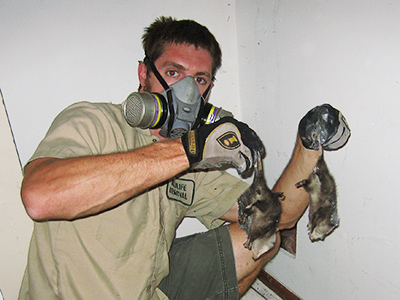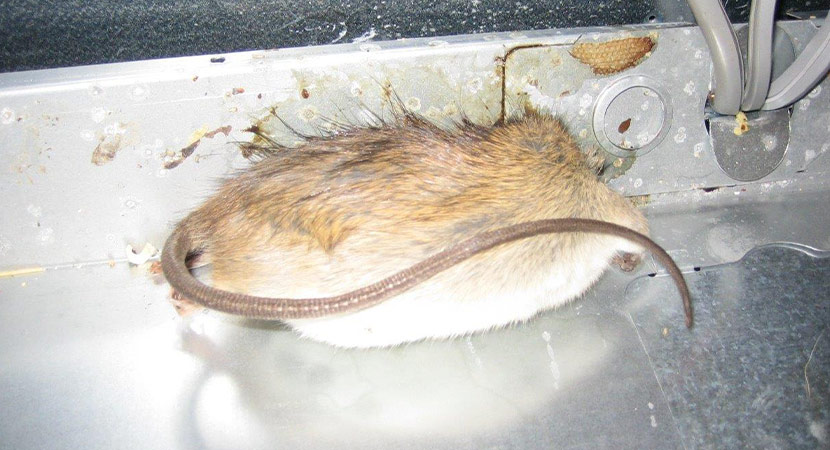Call me: 551-245-8019
Welcome to Hackensack Dead Animal Removal! Got a terrible smell in your house, or do you see a dead critter on your property? We are an animal control company specializing in the removal of dead animals from your home, attic, basement, walls, yard, or any part of your property. You clearly don't want a dead animal in your house. Carcasses attract flies and give off terrible smells, not to mention the potential diseases rotting flesh can cause. Whenever we remove dead animals, we use 100% safe methods and make sure to disinfect your home and get rid of all traces of odor. Click here for Free Roadkill Removal and click here for Dead Pet Body Removal. For deceased wild animals in your home or property, call us anytime at 551-245-8019 to schedule an appointment for today! We come out fast! Some of the services we offer include:
- Dead Animal Removal
- Foul Odor Diagnosis
- Full Property Inspections
- House Damage Repairs
- Dead Body Location Services
- Proper Carcass Disposal
- Cleanup & Decontamination Services
- Deodorization Services
CALL US ANYTIME AT 551-245-8019

If you think having an unwanted live guest in your house is upsetting, wait until you experience dealing with a dead animal. Removal of the carcass may not only be unhygienic; it can also be dangerous. Rather than dealing with all the related logistics on your own, why not allow the professionals to handle this? Even on the off chance that you have discovered the dead body, wild animals may carry parasites and microorganisms looking for a new host. It is unpleasant and unsafe to handle them without the knowledge, experience, and protective gear. Our company provides efficient and affordable services designed to remove the body of the deceased animal and the risks that come with it. Our people have gone through at least 100 hours of training to ensure that they will be aware of the latest safety protocol and the state's regulations. We will be certain that everything will be done by the book. We also offer a guarantee and warranty on all our services and materials. If we noticed an issue between our visits, we would gladly return to redo or fix the problem with no added charges. Send us your service request, and we will immediately assign a qualified technician who will fulfill the job.
What Prices Do We Charge?
Learn about dead animal removal costs - each situation is different!
What if you found roadkill or a dead animal such as a deer in a public place, and you want the city or Bergen County services to remove it for free? Click here for Free Bergen County Dead Animal Removal services. What if a farm animal like a horse, or your beloved pet dog or pet cat has died and you need the body taken away? Click here for Dead Pet Body Removal.
We are experts in dead animal removal, and take our job seriously. When removing dead animals, we do a COMPLETE job — not only do we remove the dead animal from your home or yard, we also decontaminate the area, deodorize it, and dispose of the animal or cremate it. If you aren't sure whether the stench in your house is due to a rotting carcass or another reason, we can sniff it out with our noses from our years of experience. We remove dead raccoons, dead opossums, dead skunks, dead squirrels, dead birds, even dead dogs and cats. We frequently remove dead rodents from inside walls, because poison kills rats and mice, who die in your house. We completely solve your dead animal problem by taking these steps:
- Sniff out the dead animal if it is somewhere in your home
- When necessary, for example if the animal is in a wall or under your house, cut a hole to remove the animal
- Remove the dead animal, safely and completely (and seal the hole if needed)
- Finish the job by decontaminating and deodorizing your home
- Properly dispose of the dead animal through incineration or other means
- Prevent it from happening again by finding out how they got in your house
Dead animal carcass removal is specialty work. Sometimes the job is simple, such as a dead opossum in the yard, in which case we can simply wear our gloves and respirator mask, bag the carcass, and take it away for incineration. Sometimes this is more complex, such as when the dead animal is under a home crawlspace, under a porch or deck or shed. Or if the animal is larger, such as a dog or a deer. The most complex cases are dead animals inside the house. The animal may have died inside the attic, or down in the walls, or the duct work, or any other part of the architecture. You may have a bad smell in your home, and you're not even sure what's causing it. We've removed not just dead animals, but rotting food, bad mold, etc. We specialize in locating the source of the smell, and we very commonly cut a hole in the ceiling or wall to remove the animal. We remove every bit of the carcass, mop up the juices, vacuum the maggots, spray it and wipe it down with disinfectant, cleaner, and we repair the hole we cut. In some cases we use ozone machines to neutralize odor.
Hackensack Dead Animal Tip: How Long Does It Take for Dead Animal Odor to Go Away?

If you’ve experienced a dead animal in your house, you know exactly how horrible it smells. And unless you’re a vulture, you’ll find the smell sickening. Little wonder getting rid of the carcass and smell becomes the only thing on your mind. In this post, we explore the time it takes for the dead animal odor to go away.
How Long Will a Dead Animal Smell for? After the death of an animal, decomposition starts. As the body decomposes, it releases a combination of sulfur dioxide, benzene derivatives, methane, and long-chain hydrocarbons that produce the characteristic ‘smell of death’. The carcass will continue to smell until decay is complete. It may last for a few days, weeks, or months, depending on several factors. Some of which include:
Size of the animal
All other things being equal, the larger the animal, the longer it takes to complete decomposition. Therefore, if you have a dead mouse, the smell will fade away within a week or two. On the other hand, a dead raccoon may take up to three weeks or more to completely decompose.
Number of animals
While having more dead animals does not necessarily mean a longer decomposition time, it means a stronger intensity of the putrid odor. However, if the deaths occur at different times, then the period of smell can be elongated. As an example, if a mother raccoon dies under your crawlspace, you might begin to notice the foul smell. In a couple of days or weeks, her pups may also die due to the lack of parental care. Since their death occurred much later, it will surely extend the duration of the noisome odor.
Environmental conditions
The prevailing conditions of temperature, pressure, and humidity also affect the rate of decomposition. At colder temperatures, decomposing organisms will be less active, and the rate of decomposition remains low. The converse is also true. The decomposition rate of a dead animal is known to increase with increasing pressure, and vice versa. Generally speaking, an increase in humidity increases the decomposition rate. This is because decomposers like fungi, bacteria, worms, and maggots thrive in the presence of increased moisture. As you can see, the rate of decomposition of a carcass is dependent on many factors - and these factors determine how long the odor will last.
How to Deal with Lingering Carcass Odor
If you have a dead animal in your house, the first thing you've got to do is locate the carcass and dispose of it. To find the carcass, you have to use your nose to follow the smell to where it is most concentrated - that’s the likely position of the carcass. Ensure that you wear gloves and protective clothing before you pick up the carcass and dispose of it. Even after you remove the carcass, as well as remnant materials, the bad odor will linger. This is mainly because of the pollution a dead animal causes. The bodily fluids of the carcass would have seeped into surrounding materials.
For instance, if you have a raccoon in your attic, the urine, droppings, and bodily fluids of the raccoon would have soiled the insulation and seeped into the wooden structure. If that happens, the terrible odor will continue to linger as long as the insulation material remains there. Replacing the infected insulation might be the only way to eradicate the odor.
After removing the carcass, it’s important that you clean, disinfect, and deodorize the infected space. You first need to dispose of all remnants left by the animal. This includes nesting materials, as well as droppings, maggots, and roaches. Ensure you wear gloves before touching these remnants.
Thereafter, use an enzyme-based cleaner to kill all biohazards. Once you’re done, apply a deodorizer to get rid of all lingering odor. Common natural deodorizers include briquette charcoal, coffee filters, and vinegar.
Wrap Up
A dead animal will continue to smell until decomposition is complete. The rate of decomposition is dependent on the size of the animal, the number of dead animals, and the prevailing environmental conditions. Removing the carcass doesn’t guarantee the smell will go away. To deal with the lingering smell, you need to clean, disinfect, and deodorize the infected area.
We service nearby towns such as Paramus, Hackensack, Ridgewood, Fort Lee, Teaneck, Englewood, Mahwah, Fair Lawn, Bergenfield, Wyckoff, Ramsey, Tenafly, Westwood, Lyndhurst, Cliffside Park, Glen Rock, Lodi, Montvale, Garfield, Township of Washington, Dumont, New Milford, Edgewater, Rutherford, Saddle Brook, Hillsdale, Closter, Elmwood Park, Franklin Lakes, Teterboro, Oakland, Waldwick, Oradell, Emerson, Maywood, Rochelle Park,.